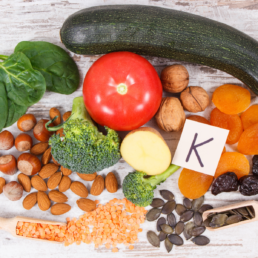Introduction: The Essential Role of Vitamin K2
Vitamin K2 is a remarkable and essential nutrient, notable for its multifaceted contribution to our health. Predominantly recognized for its crucial role in heart health and bone preservation, Vitamin K2 is an under-appreciated vitamin that significantly influences our overall well-being. Found in a variety of foods such as cheese, liver, and egg yolks, this nutrient is often lacking in our daily consumption, making supplementation a practical solution for many. Ultimate Nitric Oxide Nutrition contains an effective 180 mcg dosage of Vitamin K2, perfectly geared to fulfill this dietary gap.
Vitamin K2: A Brief History
Vitamin K was first discovered in 1929 as an essential nutrient for blood coagulation. The letter ‘K’ comes from the German word ‘Koagulation.’ Vitamin K2 (menaquinone) was later distinguished as a member of the vitamin K series and was found to have distinct benefits separate from its Vitamin K1 counterpart [1]. With increasing research, it’s now evident that K2 plays a significant role in various bodily functions, from cardiovascular health to cognitive function.
Unpacking the Heart Health Benefits of Vitamin K2
A profound influence of Vitamin K2 is on heart health. Vitamin K2 carries the unique capacity to regulate calcium in the body – directing it towards the bones and teeth, where it’s required, and away from the arteries and veins, where it can cause calcification and potential cardiovascular diseases [2]. By inhibiting calcium deposits in arteries and veins, Vitamin K2 promotes the health and elasticity of these blood vessels, thus reducing heart disease risks.

Understanding the Dosage: Why 180 mcg?
Optimal dosage recommendations for Vitamin K2 can differ depending on individual factors. However, research indicates that a daily intake of around 180 mcg for most adults ensures adequate utilization of this vitamin without risking overdosage [3]. This dosage provides a safe and effective means to harness the benefits of Vitamin K2 and maintain a healthy balance within the body.
The Influence of Vitamin K2 on Veins and Arteries
Vitamin K2 has a direct, significant impact on our veins and arteries. By activating a protein called Matrix GLA protein (MGP), K2 effectively inhibits calcium from depositing in the walls of blood vessels, ensuring their flexibility and healthy function [4]. The result is an essential reduction in vascular calcification, promoting healthy blood flow and decreasing the risk of various cardiovascular ailments.
Vitamin K2: Its Effects on the Brain
Emerging research suggests a promising role for Vitamin K2 in supporting brain health. Vitamin K is involved in the synthesis of sphingolipids, a type of fat abundant in brain cells, crucial for their health [5]. Furthermore, Vitamin K2’s role in calcium regulation can potentially prevent calcification and subsequent degradation of neural tissues, reducing the risk of neurodegenerative disorders such as Alzheimer’s disease.
Vitamin K2’s Potential Role in Cancer Prevention
Increasing evidence hints at Vitamin K2’s potential role in cancer prevention and treatment. Preliminary studies suggest that Vitamin K2 can inhibit the growth of various types of cancer cells [6]. While more extensive research is necessary in this field, the initial findings are indeed compelling.
Additional Benefits of Vitamin K2
Beyond its influence on heart health, veins, arteries, brain health, and potential cancer prevention, Vitamin K2 has a plethora of additional benefits. For instance, Vitamin K2’s role in bone health is noteworthy. It activates a protein called osteocalcin, which helps bind calcium to the bones, preventing conditions like osteoporosis [7].
Additionally, Vitamin K2 supports dental health by preventing calcium from accumulating and contributing to tooth decay [8]. Moreover, Vitamin K2 plays a role in supporting a healthy immune system and regulating blood sugar [9].
Is Vitamin K2 Safe?
Vitamin K2 is generally safe for most people when taken by mouth or injected into the vein appropriately. Most people can take it without any adverse side effects. However, each individual’s tolerance can vary, and it’s important to follow the recommended dosage guidelines and consult with a healthcare provider before starting any new supplement regimen [10].
American Heart Association Study
The American Heart Association’s published study reported that vitamin K2 supplements did not slow the progression of calcium deposits on the aortic valves in older men. This conclusion may indeed be disheartening to those hoping for a non-invasive method to mitigate aortic stenosis. However, it’s essential to interpret these results in the broader context of scientific research, which often includes conflicting findings and unexpected outcomes.
Firstly, the nature of scientific exploration dictates that single studies, even if randomized and double-blind, should not be seen as definitive. Each study has limitations and nuances that need to be considered. Also, a body of research is typically more significant than individual findings. Just because one study did not find an effect does not mean that the effect does not exist. It could mean that the effect was not detected due to various factors related to study design, population, dosage, timing, and so forth.
Next, it’s important to recognize that this study focused on individuals with already established aortic stenosis. The process of calcification had already begun in these individuals. The role of vitamin K2 might be more preventive than therapeutic, meaning it might have a more significant impact when taken before the onset of calcification, rather than after it has already occurred.
Moreover, this study focused on a relatively specific population: older men with aortic stenosis. The results may not necessarily apply to other groups, such as women, younger individuals, or those at risk of aortic stenosis but not yet diagnosed.
Lastly, the dosages and forms of vitamin K2 used in the study could also impact the results. Different forms of vitamin K2, such as MK-4 and MK-7, have different properties, including different half-lives in the body. The dosage used might not have been sufficient to make a noticeable impact on the progression of aortic stenosis.
So, while it’s essential to take this study into account, it is also crucial to consider the broader context and the limitations of the study. Future research should continue to explore the role of vitamin K2 in heart health, including its potential preventive role and its impact in different populations.
